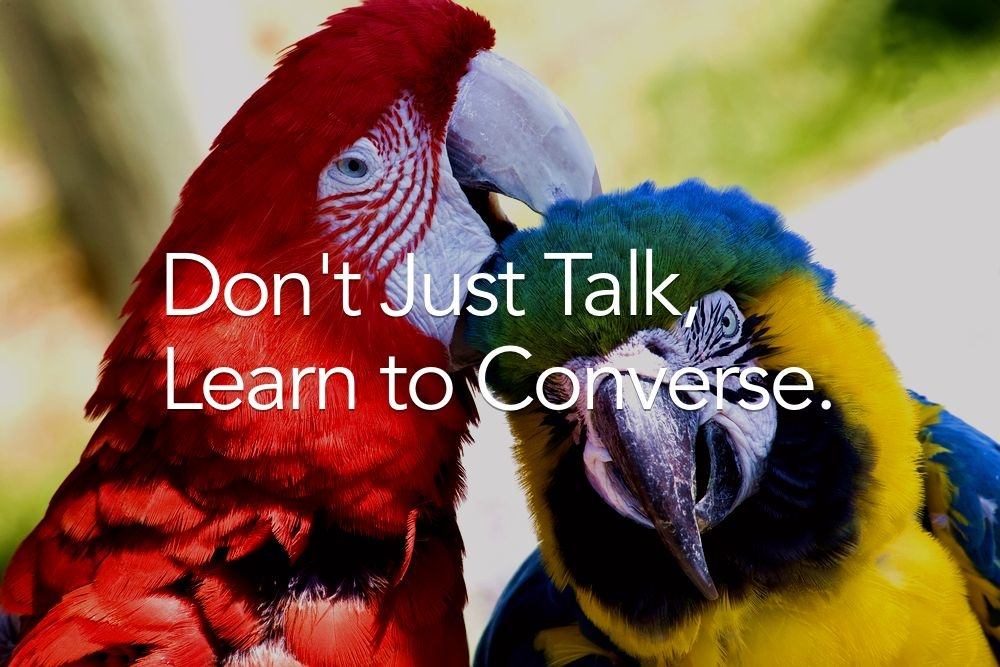What about you? Are your dialogues merely parallel monologues? Granted, it takes two to tango: if your fellow conversationalist is solely interested in telling things to you or saying things at you, you may have your work cut out for you to have an actual conversation. How can you make it happen?
The Power of Questions
Questions are powerful because they can be used to guide a conversation. When you ask someone a question, it initiates two beneficial things: first, it signals to them that you want to hear what they have to say, and second, it reminds you that you have to actually listen. After all, you’re the one who asked. For questions to create true dialog, you have to have your intent in the right place. If you really don’t care what their answer is, the question will be neutered: if you are busy thinking about what you will say next (even if it is to formulate another question) instead of caring about their response, the power is sapped away. It’s when you honestly have the objective of understanding their viewpoint and position that you open the door to actual interaction.
I Tried Listening Once, but It Was Hard
Listening without preconditions is a habit that is not instinctual—It must be formed. If you are only listening so as to refute their statements or to redirect the flow, you miss out on a powerful part of conversation. Like many worthwhile habits, listening might be hard at the beginning. You will likely have to exercise some self-control, and you might have to remind yourself of your objective to interact. Like anything else, however, if you just commit to some consistency in listening, it will become easier and easier until it is natural for you.
Hey, I’m the Only One Listening Around Here!
Having honed your listening skills, you have passed the first hurdle of successful communication and people will no doubt enjoy talking to you more. Everyone loves to be heard, but you are still seeking that elusive two-way conversation where you not only hear but are heard as well. How do you get the other party to listen? People are quite enamored with their self-interest, so if you want someone to do something, make it in their best interest to do it. In this instance, you want them to reciprocate and listen to you, so how do you make it worth their while? Let’s start by considering what doesn’t work. It doesn’t work to try to tell them what their interests are or, worse yet, should be. Back when you were asking questions and listening to their answers (remember that part?), you had the opportunity to uncover what they considered to be valuable. This is no time to make judgments about their choices—just hear what is shared, and build on that. Think about it: don’t you want to hear about things that interest you, support your beliefs, or offer potential benefits? We humans are all the same in this regard—acknowledge their desires, and they will follow you where you lead. Start by building on that which is familiar and desirable to them. Next, introduce something new and interesting; something that takes them to a new and better place, but keep in mind that “better” has to be better in their eyes, not just yours.
Bit by Bit, Bite by Bite
The process of listening and being heard cycles over and over again in successful conversations; it layers and builds. Don’t try to take on too much in one cycle or demand too much of the other person when you want your “turn”, as an ongoing exchange is the easiest path. You’ll soon find yourself engaged in listening, and enticing them to listen. Information is being exchanged and viewpoints are being expanded: you’re communicating! Once you start having actual conversations you will wonder why you ever settled for just talking at people rather than with them. You will find that others are moved and so are you; the richness of life deepens and a broader world expands before us. I’m glad we had this little chat. Aren’t you? Where have your conversations resulted in true communication? Tell us by commenting below. Featured photo credit: Grooming Green Wing Macaw and Blue Gold Macaw Close Up via Shutterstock
